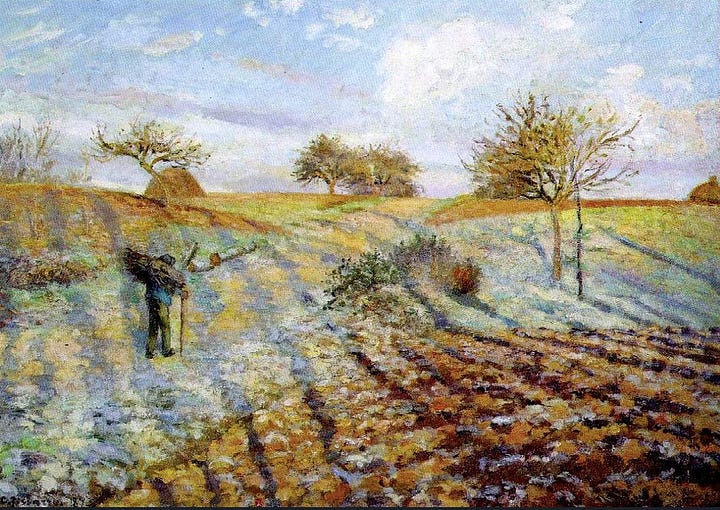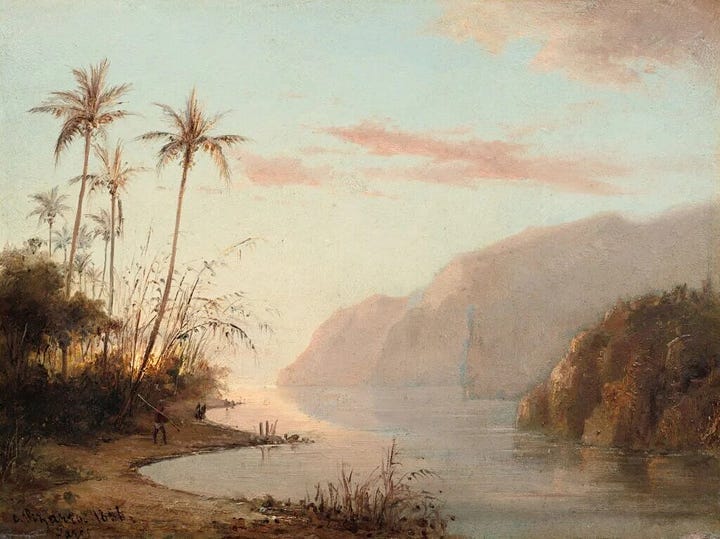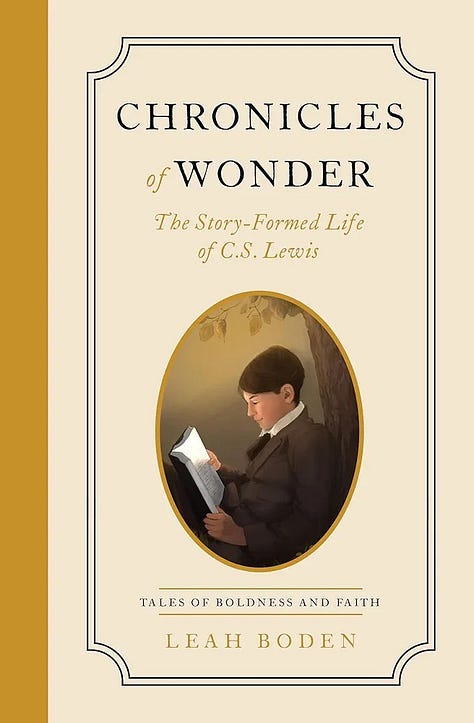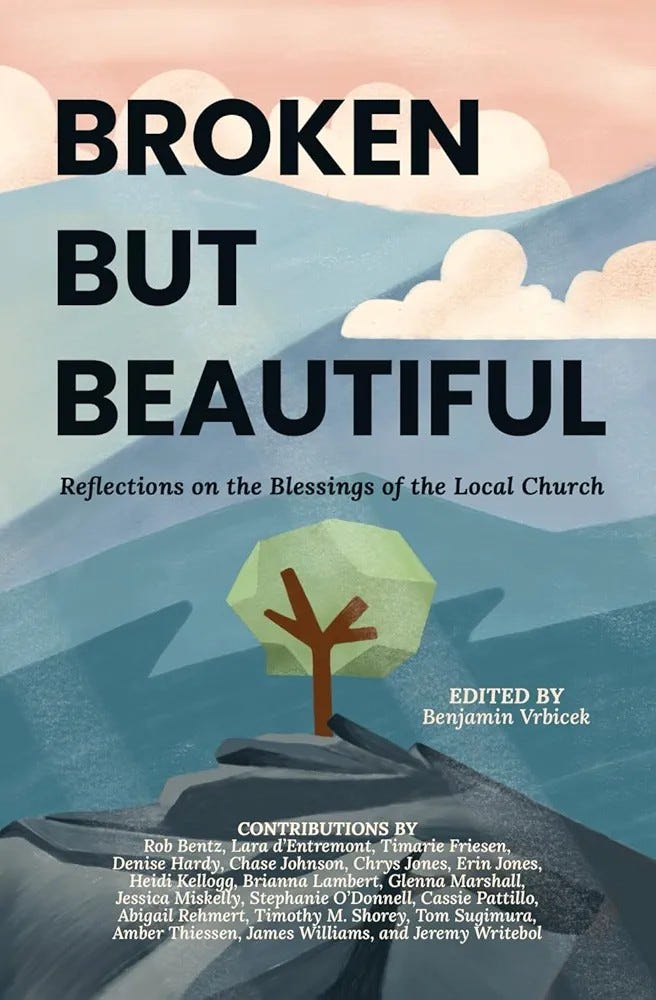
Welcome dear readers and friends. January is coming to an end and the year 2025 is in full swing. I wonder how you are feeling… Content? Hopeful? Stressed? Angry?
I am thankful to be approaching this last week of January with more peace and hope than I did at the beginning. Largely due to comfort found in the words of Christ, the faithful prayers of friends, my own prayers to the God who sees, and good books.
However and wherever you are as you read— I pray that this selection of goodness and beauty warms your heart and somehow meets you at the point of your need.
But first, if you don’t read anything else— please read this:
Art
My children and I are choosing one artist to focus on and enjoy each month. January’s choice was Camille Pissarro (1830-1903).
Biography (via the TATE Museum):
‘Jacob Abraham Camille Pissarro ( piss-AR-oh; French: [kamij pisaʁo]; 10 July 1830 – 13 November 1903) was a Danish-French Impressionist and Neo-Impressionist painter born on the island of St Thomas (now in the US Virgin Islands, but then in the Danish West Indies). His importance resides in his contributions to both Impressionism and Post-Impressionism.
In 1873 he helped establish a collective society of fifteen aspiring artists, becoming the "pivotal" figure in holding the group together and encouraging the other members. Art historian John Rewald called Pissarro the "dean of the Impressionist painters", not only because he was the oldest of the group, but also "by virtue of his wisdom and his balanced, kind, and warmhearted personality". Paul Cézanne said "he was a father for me. A man to consult and a little like the good Lord", and he was also one of Paul Gauguin's masters. Pierre-Auguste Renoir referred to his work as "revolutionary", through his artistic portrayals of the "common man", as Pissarro insisted on painting individuals in natural settings without "artifice or grandeur".
Pissarro is the only artist to have shown his work at all eight Paris Impressionist exhibitions, from 1874 to 1886. He "acted as a father figure not only to the Impressionists" but to all four of the major Post-Impressionists, Cézanne, Seurat, Gauguin, and van Gogh.’
I love that Pissarro encouraged fledgling artists, playing a pivotal role in shaping artistic community and development. A wise, kind and father-like mentor who influenced major figures in the Impressionist art movement and beyond.




Podcasts
‘In this conversation, Andrew Peterson shares his journey from being a pastor's kid to a successful songwriter and author. He discusses the importance of faith, creativity, and the influence of family and friends in shaping his life and work. Peterson reflects on the challenges of parenting, the creative process of writing for children, and the significance of community in his life. He also shares insights into his upcoming projects and the balance between career and spiritual life.’
‘In this episode, host Jay Kim converses with Rich Villodas, lead pastor of New Life Fellowship and an influential voice in spiritual formation. Together, they explore insights from Villodas's discipleship journey and his vision for a life of peace that draws deeply from God’s presence and loving attentiveness.
With insights from his latest book, Good and Beautiful and Kind, Villodas challenges us to meet God’s grace with personal effort to encounter him, whether daily, weekly, monthly, or yearly, and provides practical guidance from his own spiritual rhythms.’
‘In this episode, Jay Y. Kim is joined by Sarah Cowan Johnson, a ministry trainer, consultant, coach, and author of Teach Your Children Well. Together they explore effective strategies for everyday family discipleship and discuss how parents can be expectant and aware of God’s presence and ongoing work in their children. Drawing on her extensive ministry experience, Johnson emphasizes the importance of parents leading the way in their children’s spiritual formation through attentiveness, countercultural choices, and intentionality in the ordinary moments of family life.’
‘Sarah Clarkson is a writer whose work centers on beauty and grief, story and quiet. She has written of herself, “I’m trying to write well about my own sorrow, and my own encounters with the beauty that defied my darkness and drew me into a life of creativity, quiet, and wonder.” She studied theology at Oxford University. She is the author or co-author of six books, most recently Reclaiming Quiet: Cultivating a Life of Holy Attention, which she wrote to answer her own questions about what it means to have a quiet mind in a fallen, screen-driven world. In this episode, Sarah and Jonathan Rogers discuss a better definition of quiet, the importance of physical presence, the dangers of screens, and the value of boredom.’
Articles
‘My Mamaw always saw something in people that they could not see in themselves. I was no exception. My Mamaw loved me just the way I was (and said and showed that often) but she also loved me enough to gently push me. Sometimes not so gently, but with a switch! As if knowing my future calling, she threw Scripture, books, and people into my path that helped guide me into teaching. (I just wanted to be left alone and hide). When I became a teacher, she bragged about it. When it was time to make a big move, she was the one who prophesied it. When my wife wants to poke fun of me, she calls me Mamaw’s Boy.’
‘Every writer has a different part of the process that causes the most stress. For me it’s generally the first 80% or even 90% of the process. The part I love most is the last part: searching for the best word, moving the parts of sentences, refining, polishing, exacting.2 Until I get to that point, I am generally despairing that I have the ability to do the project at all. I berate myself for agreeing to do it in the first place. What was I thinking? How did I get myself into this mess again??? Until I’m at those final steps of revision (which I love so much), it feels like I will never get there. I can’t see the end at all. I would completely despair if I hadn’t gone through the process so many times that I know I will get there regardless of how I feel. I have learned to trust the process. But still, in the process, what I feel is stress.
So the first thing that’s stressful about being a writer is, in short, writing.’
‘In the end, when we walk to the pulpit, we are bringing with us a completely human self full of doubts, fears, uncertainty, willingness, study, ideas, dedication, and spirit. It is not everything we would want it to be, but Jesus has a way of taking a few small gifts, willingly given into his hands, and blessing his people through the preaching of his word.’
‘The slow drift happens quietly. What begins as a bad mood can settle into a habit of negativity. Discontent takes root, and before long, bitterness begins to bloom. Joy fades. Hope feels distant. Our hearts become closed off—less tender, less trusting, less alive.’
Tim Challies on the prosperity gospel we sometimes all believe in.
‘I know better than this. I know that the call to follow God is the call to submit everything to him and be willing to live within the circumstances he deems suitable. It’s to believe that this is my Father’s world rather than mine so that the version of reality he reveals is superior to the one I might desire. It’s to bank not just eternity on him, but time as well and not just to trust him with what follows death but with what comes before it as well.’
Music
More Great Articles!
- on a beautiful Epiphany tradition.
‘Just as the paperwhite emerges and blooms in the light, Epiphany celebrates the light of Christ revealed to the world and the call for us to grow in faith and understanding.’
‘Today, I’m walking around the city of Oxford—one of the most beautiful places in the world—and thinking about why I keep coming here. What it comes down to, at the heart of it, is trying to make myself feel small again2.’
‘I once prepared brunch for a new acquaintance and her family. She never showed up. We had arranged it in person, and I didn't yet have her number, so there was no way to call. After waiting two hours, my hungry kids and I sat down to eat the food I'd worked so hard to make—baked French toast, maple-caramalized bacon, fruit salad, apple cake.
I saw the woman a few days later at the gym and asked where she'd been. Apparently, her kid had hockey that morning. She said she didn't realize theirs was the only family invited, so she didn't think it would be a big deal not to show up. We are still courteous when we meet, but we never made plans again.’
‘The Reformed friends among us have jokingly (and at times seriously) referred to the “frowning providence of God”—that cold notion that in his foreknowledge and election, we’ve been chosen by the mercy of God. But God isn’t really all that happy about it. Or happy with us, for that matter. For many Christians, the well-placed desire to emphasize the love of God has caused us to lose touch with one of the most critical parts of the life of Jesus one could ever ponder and consider.
God actually likes you. And he actually likes being with you.’
Another great one from
on repentance.
‘The problem is that I am a human being living in a broken world and sometimes I find it easier to be broken along with everything else around me. Repentance is a part of my ongoing experience with God because I do what I do not want to do.’
‘How easily we forget— and maybe that is why
we must kneel, and feel the earth.
Maybe that is why we must get dirty,
and press seeds, with bent backs and cracking knees.’
New Books (I can’t wait to read!)
‘If you’ve been around the church for any length of time, you’ve probably experienced hurt, whether from leaders or fellow members. We understand; most of us have scars too. But the local church is the bride of Christ and God’s plan to bless the world. These eclectic essays highlight many of those blessings, from how local churches have faithfully cared for the children of divorced parents to the many ways the body of Christ lifts our eyes from our morbid introspection—all while highlighting the wonderful truth that, through all the sin and sorrow, Jesus continues to build his church.
Broken but Beautiful is edited by Benjamin Vrbicek and has contributions from many of the Gospel-Centered Discipleship staff writers and editors, as well as other writing partners of the ministry. Contributions are included from Rob Bentz, Lara d’Entremont, Timarie Friesen, Brianna Lambert, Chrys Jones, Erin Jones, Glenna Marshall, Timothy M. Shorey, Tom Sugimura, James Williams, Jeremy Writebol, and others.’
Leah Boden’s new series on C S Lewis, Charlotte Mason and Princess Aina:



Whew—it was a long one this month. May the Lord bless us and keep us as we journey into February together.
Grace and peace to you and yours,
Ishah Xx






Ishah, thank you for TWO mentions! I feel honored and blessed! Appreciate you!